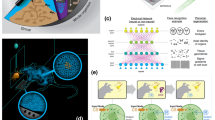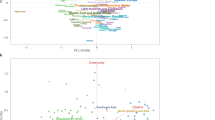Abstract
THE periodic system of the elements, arrived at originally from the collation of facts of a chemical nature, has since been most strikingly reflected by most of the physical properties of the elements. The melting points, boiling points, coefficients of thermal expansion, atomic volumes, compressibilities, densities, ionization potentials, to mention only a few properties, undergo periodic variations with increasing atomic weight or atomic number.
This is a preview of subscription content, access via your institution
Access options
Subscribe to this journal
Receive 51 print issues and online access
$199.00 per year
only $3.90 per issue
Buy this article
- Purchase on Springer Link
- Instant access to full article PDF
Prices may be subject to local taxes which are calculated during checkout
Similar content being viewed by others
References
Kendall, M. G., "The Advanced Theory of Statistics", vol. 2 (1946).
Author information
Authors and Affiliations
Rights and permissions
About this article
Cite this article
HERDAN, G. Physical Periodicity of the Periodic Table of the Elements in the Light of Statistical Theory. Nature 162, 215–216 (1948). https://doi.org/10.1038/162215b0
Issue Date:
DOI: https://doi.org/10.1038/162215b0
This article is cited by
-
On the melting poinst of transition metals
Die Naturwissenschaften (1952)
Comments
By submitting a comment you agree to abide by our Terms and Community Guidelines. If you find something abusive or that does not comply with our terms or guidelines please flag it as inappropriate.



